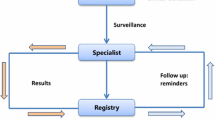PURPOSE
The prevalence of familial adenomatous polyposis-associated cancers in the United States has been conservatively estimated at 15,000, and that of hereditary nonpolyposis colorectal cancer (HNPCC)-associated cancers at 30,000. Every blood descendant of each of these patients is at risk of carrying a germline mutation predisposing them to early onset colorectal and other cancers. Optimal care of these high-risk families involves a center with expertise in the syndromes. This study was performed to see how many such centers exist in the United States and to learn something of how they work.
METHODS
The mailing lists of three international societies concerned with inherited colorectal cancer were used to send surveys inquiring about the presence of a registry or center, and how that center worked. The Collaborative Group of the Americas, the Leeds Castle Polyposis Group, and the International Collaborative Group on hereditary nonpolyposis colorectal cancer were queried.
RESULTS
There were 30 centers in the United States: 26 responded, representing 15 states. Eighteen centers that responded had registries for inherited colorectal cancer. There were 1,396 familial adenomatous polyposis families among the 18 registries, 2,058 hereditary nonpolyposis colorectal cancer families, 42 with juvenile polyposis, and 216 with Peutz-Jehger’s syndrome. The 18 registries employed 29 genetic counselors or coordinators. Seven used Microsoft Access™ as a database, five used Progeny™, three a SQL server-based system, one Filemaker Pro™, one Microsoft Excel™ and one used Oracle™. Cyrillic™ was the pedigree-drawing program in 6 registries, Progeny™ in 12, and Ped Draw™ in 1. Hereditary nonpolyposis colorectal cancer was defined using the Amsterdam I criteria by four registries, Amsterdam II by five, both criteria by six, Bethesda guidelines by one, and by genotype alone in two registries.
CONCLUSIONS
The United States is underserved by registries for inherited colorectal cancer, having enrolled only a small proportion of the families theoretically available. Registries differ in fundamental aspects of function. More collaboration and more registries are needed.
Similar content being viewed by others
References
Spiegelman, Ad, Thomson, JP (1994) “Introduction, history and registries” Familial adenomatous polyposis, Edward Arnold, London
VA McKusick (1974) ArticleTitleGenetics and large-bowel cancer Am J Dig Dis 19 954–8
HT Lynch JF Lynch (1994) ArticleTitle25 years of HNPCC Anticancer Res 14 1617–24
H Jarvinen A Husa S Aukee S Laitinen M Matikainen T Havia (1984) ArticleTitleFinnish registry for familial adenomatous polyposis coli Scand J Gastroenterol 19 941–6
J Burn P Chapman J Delhanty et al. (1991) ArticleTitleThe Northern region genetic register for familial adenomatous polyposis coli: use of age of onset, CHRPE and DNA markers in risk calculations J Med Genet 28 289–96
S Bulow J Burn K Neale J Northover H Vasen (1993) ArticleTitleThe establishment of a polyposis register Int J Colorect Dis 8 34–8
JM Church E McGannon (1995) ArticleTitleA polyposis registry: how to set one up and make it work Semin Colon Rectal Surg 6 48–54
T Myrhoj I Bernstein M Bisgaard et al. (1994) ArticleTitleThe establishment of an HNPCC register Anticancer Res 14 1647–50
MA Rodriguez-Bigas PH Lee L O’Malley et al. (1996) ArticleTitleEstablishment of a hereditary nonpolyposis colorectal cancer registry Dis Colon Rectum 39 649–53
JR Jass SM Stewart CJ Chapman MR Lane (1993) ArticleTitleEstablishment of a registry for hereditary nonpolyposis colorectal cancer in New Zealand N Z Med J 106 309–11
S Bulow C Bulow T Faurschou Nielsen L Karlsen F Moesgaard (1995) ArticleTitleCentralized registration, prophylactic examination and treatment results in improved prognosis in familial adenomatous polyposis Scand J Gastroenterol 30 989–93
HJ Jarvinen (1992) ArticleTitleEpidemiology of familial adenomatous polyposis in Finland: impact of family screening on the colorectal cancer rate and survival Gut 33 357–60
HF Vasen G Griffioen GJ Offerhaus et al. (1989) ArticleTitleThe value of screening and central registration of families with familial adenomatous polyposis: a study of 82 patients in the Netherlands Dis Colon Rectum 33 227–30
F Giardiello JD Brensinger GM Petersen et al. (1997) ArticleTitleThe use and interpretation of commercial APC gene testing for familial adenomatous polyposis N Engl J Med 336 823–7
PC Schroy SuffixIII AF Barrison BS Ling S Wilson AC Geller (2002) ArticleTitleFamily history and colorectal cancer screening: a survey of physician knowledge and practice patterns Am J Gastroenterol 97 1031–6
JA Thompson GL Wiesner TA Sellers et al. (1995) ArticleTitleGenetic services for familial cancer patients: a survey of National Cancer Institute cancer centers J Nat Cancer Inst 87 1446–55
Church, JM, Williams, B, Casey, G (1996) Molecular genetics of colorectal neoplasia: a primer for the clinician, Igaku-Shoin, New York
S Bulow (2003) ArticleTitleResults of national registration of familial adenomatous polyposis Gut 52 742–6
HF Vasen JP Mecklin PM Khan HT Lynch (1991) ArticleTitleThe International Collaborative Group on Hereditary Non-polyposis Colorectal Cancer (ICG-HNPCC) Dis Colon Rectum 34 424–5
HF Vasen P Watson JP Mecklin HT Lynch (1999) ArticleTitleNew clinical criteria for hereditary nonpolyposis colorectal cancer (HNPCC, Lynch Syndrome) proposed by the International Collaborative group on HNPCC Gastroenterology 116 453–6
Author information
Authors and Affiliations
Corresponding author
Additional information
Reprints are not available
For information on joining the Collaborative Group of the Americas on Inherited Colorectal Cancer, contact James Church, Desk A-30, Cleveland Clinic, 9500 Euclid Ave., Cleveland, OH 44195. Phone: 216-444-9052, Fax: 216-445-8627, e-mail: churchj@ccf.org
For information on joining the International Society for Hereditary Gastrointestinal Tumors, contact Kay Neale, St Marks Hospital, Northwick Park, Watford Road, Harrow, Middlesex HA13UJ, England. e-mail: Kneale@netcomuk.co.uk
About this article
Cite this article
Church, J., Kiringoda, R. & LaGuardia, L. Inherited Colorectal Cancer Registries in the United States. Dis Colon Rectum 47, 674–678 (2004). https://doi.org/10.1007/s10350-003-0115-5
Published:
Issue Date:
DOI: https://doi.org/10.1007/s10350-003-0115-5




